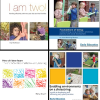Using the local environment enables children to develop a sense of belonging to the local community. It helps them to develop a sense of place which in turn will develop their feelings of security, and “strong bonds to a particular place endure” (Hay, 1998 in Jack, 2010). Through developing this sense of place, it leads to having a pride in their local community. As MacIntyre (2007) says, “place marks us all and leaves its traces”.
By developing a sense of place, children can begin to take some responsibility for looking after certain aspects of it. They can be included in problem solving and to learn about environmental issues in meaningful situations. By having repeated visits to the same place they can begin to identify features that change over time as well as those that remain the same. For example, a deciduous tree will alter as the seasons progress over time, however an evergreen tree will more or less remain the same. The built environment provides many opportunities to think about the different professions people are involved with.
Children learn best through first-hand experiences and going out into the local environment, or even further afield, enables children to explore and experience the different features found locally to them. Using these first-hand experiences enables children to develop a deeper comprehension of the Understanding the World Area of Learning particularly People and Communities and The World.
Stoke, like many places, has a richness of geographical features from the canals, factories both old and new, to open spaces. It is this richness that provides so many different opportunities for learning outside the setting. By using these spaces with interested and motivated adults will enable children to “catch” the interest and gain a sense of ownership of being part of the local environment, and a pride in their locality.






Early Education
2 Victoria Square
St Albans
AL1 3TF
T: 01727 884925
E: office@early-education.org.uk